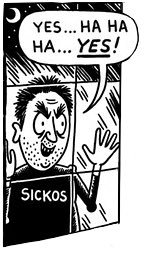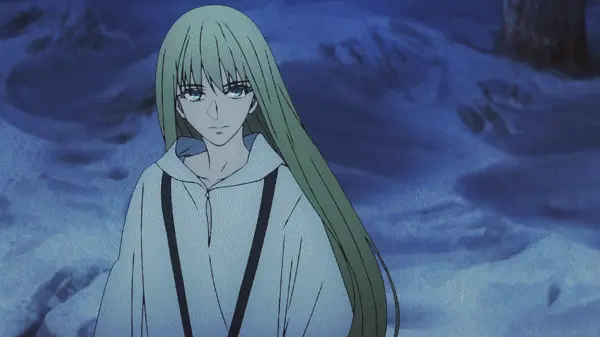I'd love a TV community for my Korra struggle sessions
Remember when there was a bad emperor and the show solved it by having his son be a good emperor. Most monarchist shit I've ever seen.
Remember when there was a tyrant monarch that everyone hated and an anarchist group killed her and broke down the literal walls dividing the classes in the capital city and all of that was treated like a bad thing
I just finished the first Kyoshi novel and enjoyed it a lot. Looking forward to the second and all her Dai Li bullshit a lot.
Sadly you wont find that in Shadow of Kyoshi. It was nice, but disapointing.
It wasn't, though. Literally no one ever condemns the killing of the queen besides Mako and Bolin's grandma. It was chaotic, but the end of any monarchy is chaotic.
Posting this from the anime channel in discord, with some edits.
Korra would have been better if the writers weren't libs, and the producers let them do whatever. A major issue with the show is that seasons 1 and two were ordered independently, so both had to tell complete stories. Korra would obviously be a much better show if the writers were able to plot out a coherent story, rather than three separate ones. But here's how I'd fix LoK.
In Book 1, get rid of the bending allegory, have Amon being a full ML revolutionary, Korra fights against him, and he flees Republic city at the end. B1 could also do with cutting most of the romantic subplots, and just start building Korrasami from episode one. Have Asami run into Korra soon after she arrives in the city or something, if you must have Asami crash into someone.
Unalaq plot is kinda bad, but could be redeemed if they took out the dark avatar part. Have S2 be about the Northern Water tribe trying to impose it's culture on the south. I really like the Wan story, so I think it could be redeemed somehow. Have Raava/Vaaty represent sort of human's and spirits, respectively. Wan fucked up and separated them. Definitely make Eska(or Desna?) less abusive, or at least don't play it for laughs. Amon's story could be connected in here somewhere, since he's from the Northern Water Tribe.
In S3 bring back Amon, and have him join up with Zaheer, who would be an actual anarchist (none of this "cHAos iS tHE naTURAL oRdEr!" bullshit. They spend the season plotting revolution, rather than half-assed adventurist regicide. As the season goes on, Korra joins up with them after seeing how terrible things are for the working class in the Earth Kingdom and Republic City. This might seem out of the blue, so more building up to it would be needed, obviously, but it doesn't go against Korra's character. She's a lib, but one of those libs with good intentions. Remember how in Book 1 she tried fighting the cops when they wanted to arrest protesters? Before leaving, she yells at Tenzin who wants to remain neutral, and as a result the air nomads schism. Due to the revolutionary threat, the world leaders appoint Kuvira head of an anti-communist army. The final battle of S3 is Kuvira vs. Korra, and ends with Korra weakened by mercury poisoning, like in the show. Zaheer and Amon have either fled, been imprisoned, or killed.
S4 Would take place 3 years later, Kuvira has fully taken over the Earth Kingdom after crushing the revolution. The plot should be basically the same as S4, but less lib, and have it end with the beginnings of an actual revolution.
Character wise, Asami and her dad should be regular engineers, in order to combat the 'iron-man archetype.' Varrick should be less abusive, and dirt poor, eccentric and brilliant. In fact, I don't think Varrick should appear in Book 2. Just replace him with some other rich fuck, and have him appear for the first time in Book 3.
I think criticisms of Korra's politics as hyper-lib are generally shallow but not completely unfounded. Your suggestion is fucking dope.
Korra is a wonderful show but it's not just shitlib, it is deeply fucking reactionary.
Something about the cartoons of that era, like 5-8 years ago, they were all pretty much openly right wing in outlook.
Each villain in Korra was a caricature of various political ideologies (socialism, environmentalism, anarchism, and fascism, in that order). The first three all boiled down to a complete and utter lack of understanding of those ideologies in favor of "tHe SoCiAllStS wAnT tO tAkE yOuR sTuFf"-tier shit takes (socialists are all evil, envious people who just want to take things away from those better off than them, environmentalists are hypocrites who want to burn down society because they don't like change, anarchists just set stuff on fire and nothing else, etc), and the only villain that was portrayed sympathetically was the fascist.
This guy does a real good job of breaking down each season and how the politics are just utter trash, but that's basically what it boils down to.
Kay's Korra videos are dope as hell. I found them here and I concur 100%.
Yeah I really liked that they brought him back for that.
Oh definitely. Propaganda of the deed is not an effective strategy for long lasting social change—should've teamed up with now-leaderless Equalists to get a mass movement behind his ideology.
The different personalities of the protagonist is not the reason the original series is better. Pointless article.
Ok but the entire story line of TLoK is just "good things???? Actually bad"
All the villains were actually based
I think this is an extremely shallow reading of the show that takes the 8 year old's perspective of protagonist = good, antagonist = bad. You are obviously supposed to agree with a lot of what the antagonists day and do. It's actually explicit. Every season Korra goes "damn, they are right tho"
Yeah I feel like the show does a great job of Korra internalizing the societal critiques that each of the antagonists puts forward.
Kuvira's an actual fascist who works to ethnically cleanse the Earth Empire. She's also the only villain the show tries to redeem. :thinkin-lenin:
Zaheer gets like 5 minutes of screen time in Book 4, mostly to make him realise that his 'anarchy' was a failure. In the comics,
spoiler
Kuvira gets an entire story arc devoted to her backstory and redemption. I read it a while ago, but I'm pretty sure they even let her out of prison.
Maybe Zaheer's prison visit could be viewed as redemption, but they do 100X more of it for Kuvira.
Oh, I haven't gotten to the Korra comics yet. They're on back order right now.
Oh yeah, the comics are hot garbage. Like The Promise, where Zuko decides not to de-colonize the Earth Kingdom because some of his colonizer subjects feel a connection to the land now, poor colonizers, and the comic portrays that claim to the land as similarly legitimate to that of the Earth Kingdom
I'm asking in good faith, so please don't take this as a trolling question. I genuinely want to know the answer. What does decolonisation mean in the context of avatar, when there's families from the fire nation that have lived there for 100 years? Should people from the Fire Nation just be sent back there?
The Fire Nation needs to return all land and make reparations. Fire Nation citizens in the Earth Kingdom could theoretically be allowed to stay, but that would have to be up to the people of the Earth Kingdom, particularly the people of those specific colonized parts of it.
No matter how connected they feel to the land, no matter that some of them were born there, the presence of the Fire Nation colonizers was not some accident- it was a deliberate act of war and cultural genocide.
At the very least, that chickenshit "well why don't you just share the land and be part of neither nation?" solution was some both sides nonsense, as if this was some border dispute and not a conflict where one side was the clear- and self-admitted!- aggressor and colonizer
So I understand that in the context of writing, a both sides story like this is bad. But in the plot, don't basically all the people in what becomes republic city demand independence? To me they seem more like the metis than two separate groups.
If that happened in the real world, that would be one thing.
But these people were written with the end goal of creating the United Republic so that Korra could happen, not with the goal of being an exploration of the actual dynamics of colonization. Saying "well the people wanted that" doesn't carry any water when those people are fictional and it serves the creators' needs to have the characters want that. It's an easy out for the writers, nothing more.
Ok, that's more or less what I thought, basically fine in story, but not fine to write
Same, I love both very very much. I just love that it's an extremely reliable struggle session.
I do agree with people's critiques about Korra, especially on this thread. For politics, it was the Obama years. There can only be so much. Maybe now shows could get better politics, but if Nick didn't even let them show a same sex couple on the same screen, they wouldn't allow left wing politics. Also Nick treated this show terribly. That's one reason why it felt disjointed because they didn't know when it would end until Book 3.
"[...] many of the criticisms of The Legend of Korra boil down to criticisms of Korra, and how she’s different from Aang." I have literally never heard anyone say this.
This seems like a very strange way of looking at media. Why does it even matter that Korra is important? The events didn't actually happen, who cares?
Then the article goes on to talk about the themes of both of the shows, but it doesn't lead to any conclusion, nor does it talk about how well the themes were executed. Just strange.
I just hate that our connection to the past Avatars has been lost, I miss them so FUCKing much.
I love all Avatar shows. Will the next one be about the Avatar directly after Korra? Will it be generations down so that we can skip to a Fire Avatar without having to watch an Earth avatar? I do not know! I know only that I look forward to it.
I don't know if there is a "next" one planned. There is a live-action Netflix show being made, but the original creators left the production because Netflix insisted on aging up the characters and making it gritty and sexual and shit, so it'll probably be trash
Gah, a live action show could be so cool, as long as it wasn't... bad hahaha :/ I'll probably still watch it hah
I get that, but also think it makes a lot of thematic and historical sense. The Avatars generally represent society, and industrialisation represents a radical break with the past. Korra is the first real industrial Avatar, so it makes since to me that as the world breaks its ties with its past, so does Korra. The only thing I'd do differently is have Korra keep her connection with Aang, because he's the bridge between the traditional world and the industrialised one.
I'm honestly scared of how terrible a new Avatar's politics would be
I agree with you, and I think it makes sense, but I also disagree because I’m personally tired of the narrative that industrialisation fundamentally changed humanity.
Really, as different as things are, they are still the same. Power is power. Humans are humans. It wasn’t some psycho-spiritual evolutionary threshold, it was a relatively minor social reorganization and some technological adaptations. To me, that whole narrative feels a lot like the liberal’s version of it, ‘the end of history’.
Like, we’re talking about spirit, and about humanity’s fundamental connection with the natural world (bending), and our connection to our ancestors (perhaps understood modernly as ‘evolved characteristics’ or somesuch). Those things don’t just change in 10 generations because of some technological threshold, imo, as much as different cultures like to imagine they do.
Oh wow we burn coal now instead of wood! I guess we’re suddenly a different species, time to just ignore the entirety of history up to this point hahaha
(yes fine I have some extremely personal and extremely pent-up gripes with that particular metanarrative, I really hope you don’t take this personally, you’re just the comrade who made me think of it just now hahahaha)
I won't talk about Avatar specifically, except to mention that even bending changes under industrial capitalism, losing its spiritual element and becoming profane (pro bending), used as vehicles for advertising and large corporations rather than spiritual fulfilment.
But in our world industrialisation, along with capitalism, has radically shifted everything, at least where I live. Extended family doesn't exist, the nuclear family as a structure reshapes the fabric of our society, the way we think of ourselves as individuals is radically different from how people in the 1600s thought of themselves, most people don't live on farms, etc. It was not a minor social change; for most of history, humans existed as hunter-gatherers mostly. Agriculture was a radical change, but industrialisation makes it look small. I'm not saying humans had some massive evolutionary change; biologically, we're mostly the same as we were 50,000 years ago. But the scale of our society, it's organisation, the way we think of ourselves, etc, have all been massively shifted by industrialisation.
I don't take it personally, I like discussion
This is interesting! I might make a counter-point: modern post-industrialists are more similar to even the earlier agriculturalists than those agriculturalists were to hunter-gatherers. If only from an individual-scale psychological perspective.
Hunter-gatherer societies, if anthropologists can be trusted, have extremely communialist identities. And they saw themselves as ‘embedded in’ the world, rather than ‘standing on’ it. While you might argue that farmstead culture has an element of collectivism, it’s pretty clear they have that idea that ‘the world exists to serve humanity’, that is the very essence of industrialism.
And besides, my reading of agrarian society is that it is a very individualistic thing. Farms are groups, ya, but they belong exclusively, almost without exception, to the patriarch. Everyone follows the patriarchs rules, until they either marry a different patriarch or go off to found a new patriarchy of their own; hence the imperalistic tendencies of agrarian societies.
What I’m getting at is that industrialisation isn’t so much a radical shift away from what came immediately before it, but rather is a very natural expansion of those core ideas.
Much as agriculture took families out of the community, modernity takes individuals out of the family. It’s all one story, to me.
I’d be a fool to deny that industrialization didn’t change a hella lot hella fast tho, of course. If you look at all the graphs, particularly of materialist trends (consupmtion, climate change, etc), they all hockey-stick starting in the ~1950’s. And mass society, communication, all that amplifies core cultural impetuses.
I guess all I mean to say is that I tend to object to ‘industrial exceptionalism’; the idea that things were fundamentally all new again, starting right there. It was a threshold, but not necessarily the biggest or most important!
I heard a sociologist say that teens in the 1960s were more similar to people today than they were their own parents. But, also, they weren’t that different. Just like I don’t think ‘modernity’ is fundamentally different than the largely christian roots it arose from, even if it was tossed through the ringer of industrialization and rationalist secularism.
Gosh I get away from myself sometimes. But, I think, if you compare, say, you and I to a medieval christian, and then compare all three of us to someone in a traditional non-agrarian society, all three of us would have a lot more in common than the ‘hunter-gatherer’. Just... an intuition, though haha; also skewed because we’re two leftists here, of course! :)
Gorn. You should read The Origin of the Family, Private Property and the State and "Caliban and the Whitch".
You might say that new modes of production completely destroy the superstructure built above the old and only on the ashes of the old can a new society be built.
I don't care what the show's overall political message was; I have been lusting for someone to bring down the walls of Ba Sing Se since 2006.








